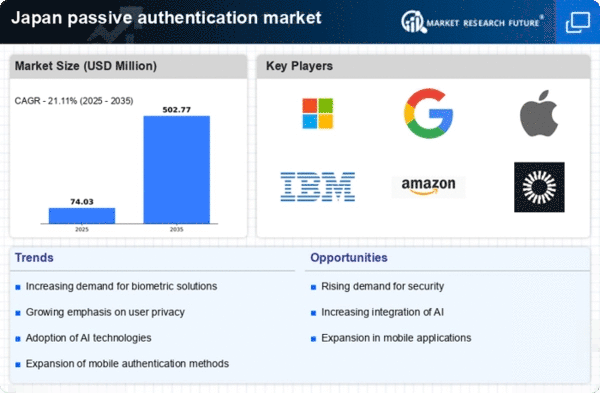Increased Mobile Device Usage
The proliferation of mobile devices in Japan is significantly impacting the passive authentication market. With over 80% of the population using smartphones, there is a pressing need for secure yet user-friendly authentication methods. The rise in mobile transactions and online services necessitates solutions that can authenticate users without requiring active input. In 2025, mobile commerce in Japan is expected to exceed $50 billion, further emphasizing the need for effective passive authentication solutions. The passive authentication market is likely to benefit from this trend, as businesses seek to implement technologies that facilitate secure access to mobile applications and services. This shift towards mobile-centric solutions may drive innovation and growth within the market.
Rising Cybersecurity Concerns
The increasing frequency of cyberattacks in Japan has heightened the demand for advanced security measures, including those offered by the passive authentication market. Organizations are increasingly recognizing the need to protect sensitive data from unauthorized access. In 2025, it is estimated that cybercrime could cost Japanese businesses over $100 billion annually. This alarming trend drives companies to adopt passive authentication solutions that enhance security without compromising user experience. The passive authentication market is thus positioned to benefit from this growing awareness, as businesses seek to implement seamless security measures that do not require active user participation. As a result, the market is likely to see a surge in investment and innovation aimed at addressing these pressing cybersecurity challenges.
Technological Advancements in AI
The rapid advancements in artificial intelligence (AI) are significantly influencing the passive authentication market in Japan. AI technologies enable more sophisticated methods of user verification, such as behavioral biometrics and machine learning algorithms that analyze user patterns. In 2025, the AI market in Japan is projected to reach approximately $20 billion, indicating a robust growth trajectory. This growth is likely to enhance the capabilities of passive authentication solutions, making them more effective and reliable. The passive authentication market stands to gain from these technological innovations, as organizations increasingly seek to leverage AI to improve security measures while maintaining user convenience. Consequently, the integration of AI into passive authentication solutions may lead to a more secure digital environment.
Consumer Demand for Seamless Experiences
In Japan, there is a growing consumer expectation for seamless digital experiences, which is driving the passive authentication market. Users increasingly prefer authentication methods that do not disrupt their interactions with digital platforms. As of 2025, surveys indicate that over 70% of Japanese consumers favor solutions that allow for frictionless access to services. This trend compels businesses to adopt passive authentication technologies that enhance user experience while ensuring security. The passive authentication market is thus likely to expand as companies prioritize user-centric solutions that align with consumer preferences. By focusing on seamless authentication processes, businesses can improve customer satisfaction and loyalty, ultimately contributing to the growth of the market.
Regulatory Compliance and Data Protection
Japan's stringent data protection regulations are influencing the passive authentication market. The Personal Information Protection Act (PIPA) mandates that organizations implement robust security measures to protect user data. As compliance becomes increasingly critical, businesses are turning to passive authentication solutions that align with regulatory requirements. In 2025, it is anticipated that the demand for compliant security solutions will drive market growth by approximately 15%. The passive authentication market is thus positioned to thrive as organizations seek to meet legal obligations while enhancing their security posture. This regulatory landscape encourages innovation and investment in passive authentication technologies, ensuring that businesses can protect sensitive information effectively.
















